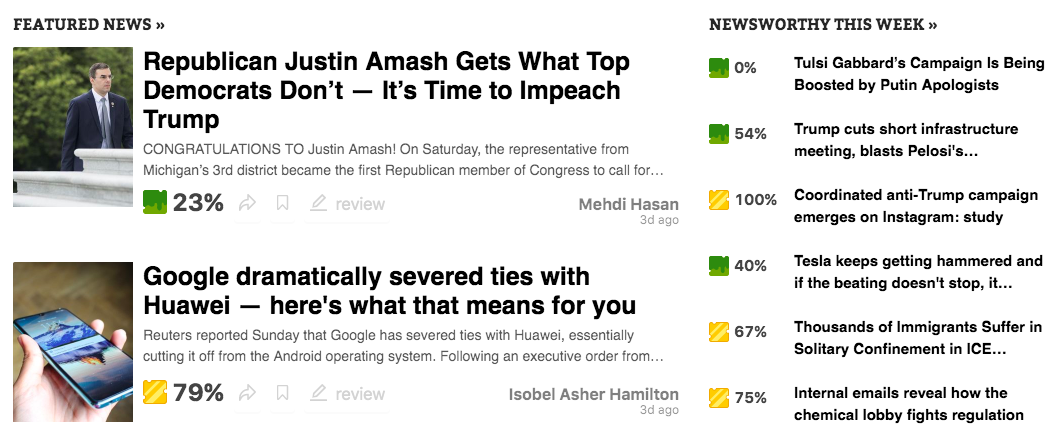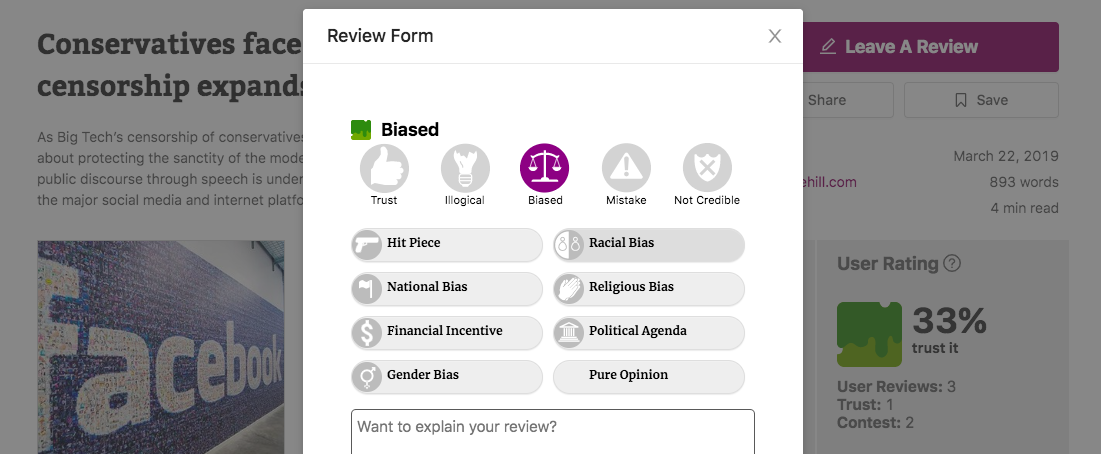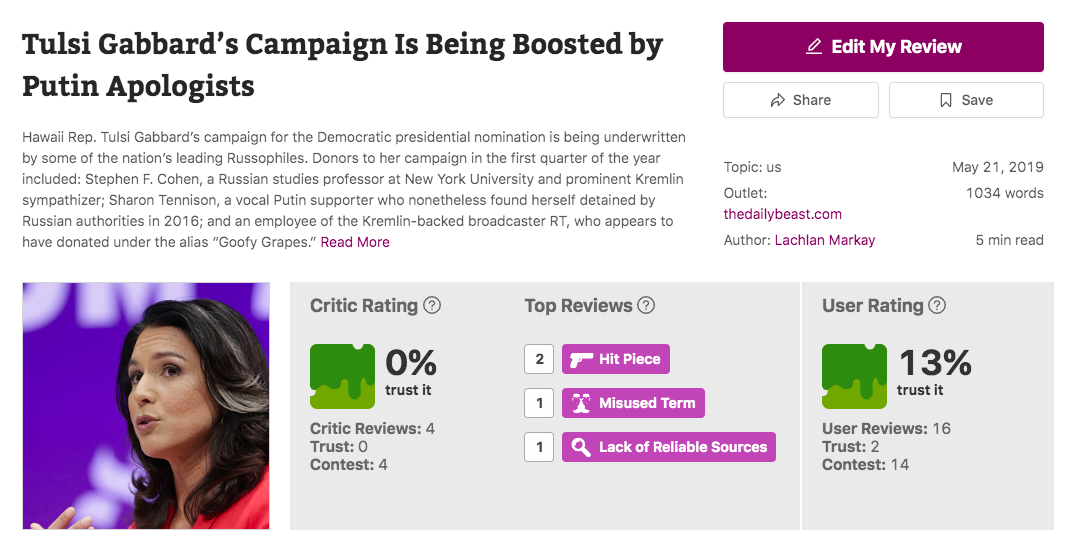Credder is a more honest NewsGuard, but there’s no way to create an incorruptible news rating app
Danielle Ryan is an Irish freelance writer based in Dublin. Her work has appeared in Salon, The Nation, Rethinking Russia, teleSUR, RBTH, The Calvert Journal and others. Follow her on Twitter @DanielleRyanJ
Published time: 26 May, 2019 14:59Edited time: 26 May, 2019 15:12

The NewsGuard news rating app was a blatant attempt to direct news consumers to pro-establishment sources while punishing alternative outlets with low trust ratings — but will the newly launched Credder be any different?
A better question to ask might be, can any news rating app — no matter who its founders, backers and users are — really work in a way that is immune from serious manipulation? A bonus question might be: Do we even really need ratings and reviews displayed alongside the news we consume?
Credder, which is still in ‘invitation only’ mode, is undoubtedly susceptible to potential manipulation and abuse, although it takes an entirely different approach to the news-rating game than NewsGuard did.
ALSO ON RT.COM'NewsGuard' app gives news sites 'trust' ratings & targets alternative media. What could go wrong?
The site will display ratings on individual articles to indicate how credible both verified journalists (the ‘Credit Rating’) and normal readers (the ‘User Rating’) found the content. It’s been dubbed the ‘Rotten Tomatoes’ for news. In other words, it’s not going to tell you what to read and what to avoid — it’s giving you an average rating based on the reviews of other people who have read the content. One individual article from, let’s say the Washington Examiner, may have a high credibility rating on Credder, while another article on that website may have a low rating.
Users can also rate individual writers on Credder, so repeat offenders (the Luke Hardings of the journalism world, for example) might end up with lower ratings than their colleagues at the same publications. Articles, writers and outlets with ratings of over 70 percent will receive a yellow ‘Gold Cheddar Cheese’ rating, while those with ratings between 30 and 70 percent will earn the ‘Provolone Cheese’ rating — and those under 30 percent will be branded the green ‘Mouldy Cheese’ of online news content. This can be a bit confusing to the eye at first, as green is normally associated with something good rather than bad.

NewsGuard takes a more Big Brother-style approach, making its own sweeping determinations about each outlet as a whole, essentially warning users away from certain content. With an advisory board that includes former US spooks and White House officials, this kind of semi-censorship-based approach isn’t surprising — and neither was the enthusiasm with which mainstream journalists welcomed NewsGuard onto the scene. After all, the app awarded ‘green’ ratings to all major mainstream US and UK media outlets, while suspiciously slapping ‘red’ warnings onto sites like WikiLeaks and RT. It remains a mystery how such a blanket valuation system could be useful to anyone.
If I were rating the raters, Credder would seem to be at least a better alternative to NewsGuard — but don’t get too excited; there are plenty of potential pitfalls here, too.
The ‘Credit Rating’ of an article on Credder will be determined by how credible “verified” journalists deem the content to be. But who are these verified journalists? What happens if the vast majority of journalists signing up for verification come from the same narrow pool of mainstream outlets? Wouldn’t a huge amount of journalists of all stripes need to sign up to mitigate the risk of establishment bias? Will journalists use the app to support their friends and down-rate their competitors?
Co-founder Jared Fesler explained on Twitter this week that the app will implement a “trust ladder” which means the more information a journalist verifies about him/herself, “the more weight will be given” to their reviews — although that doesn’t solve the possible issues with overall bias. Currently, the New York Times, the Washington Post, Vox, the BBC and the Atlantic are the top-rated websites on Credder.

I signed up to Credder and ticked the ‘journalist’ box and was verified within the day. The verification process for journalists is manual, meaning an actual human researched who I was before giving me access, which is a plus — but there’s still a broader question of how ‘journalist’ will be defined. If Alex Jones, Louise Mensch, Glenn Greenwald and Wolf Blitzer all sign up tomorrow, will their opinions carry the same weight, just because all three provide lots of verifiable information about themselves?
Credder could be open to manipulation in other ways, too. What’s to stop supporters of certain websites flooding them with good ratings, while trolls flock to others to downrate their content?
To their credit, Credder seems to be spending a lot of time thinking about these pitfalls and taking steps to mitigate them. When you leave a review for an article, you are faced with multiple options allowing you to explain your decision.

This is supposed to act as a kind of deterrent against angry people just giving bad or unreasonable reviews to articles simply because they don’t like an author or website — but surely this system is also open to being gamed by groups who coordinate their efforts?
In a Reddit AMA on Tuesday, co-founder Austin Walker said it will be against Credder rules for one person to have more than one account. That’s a good first step, but the one account rule probably couldn’t stop a determined group of schemers intent on skewing ratings one way or another.
A Daily Beast article falsely claiming that presidential candidate Tulsi Gabbard is being “boosted” by “Putin apologists” currently has a ‘Mouldy Cheese’ rating, meaning it has mostly been classed as untrustworthy. What happens when Gabbard’s detractors in the media and on social media, who revel in shoddily-sourced hit pieces like this, get wind of it? This is a perfect example of how emotions running high in the run up to elections could provoke efforts to manipulate Credder’s system. If the app took off, Credder could become an all-out battleground around election time.

Credder co-founder Chase Palmiere is a restaurant owner and has said he was inspired by how Yelp reviews had the power to change the restaurant industry — but news isn’t food.
Websites with their own political agendas are not going to change their ways because of some bad ratings on an app in the way a restaurant would endeavour to improve customer service after enough terrible Yelp reviews. The New York Times won’t stop shilling for US wars of regime change, no matter how many people flood them with bad Credder reviews — and alternative media websites aren’t going to stop seeking out the less-reported-on stories and offering alternative perspectives just because ‘verified’ journalists are giving them bad ratings on an app.
Sites like Credder and NewGuard (along with a slew of sketchy state-funded ‘disinformation busting’ outfits) have been springing up since worries about “fake news” invaded the collective consciousness a few years ago. The apps might be new, but fake news is not — and online rating systems won’t be the solution to that age-old problem.
It’s a near-impossible task to create a news rating system that can remain uncorrupted and free of manipulation. The safest thing to do for now might just be to read widely, never rely on one source for news — and ultimately, rely on your own critical thinking skills.
The statements, views and opinions expressed in this column are solely those of the author and do not necessarily represent those of RT.


0 Comments:
Post a Comment
Subscribe to Post Comments [Atom]
<< Home